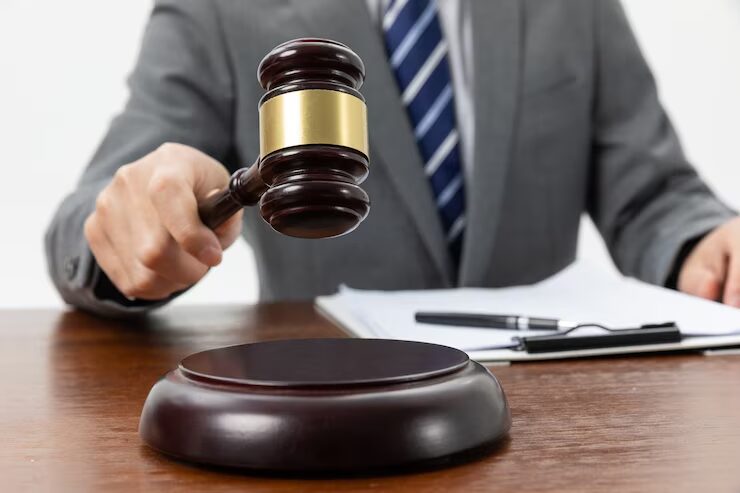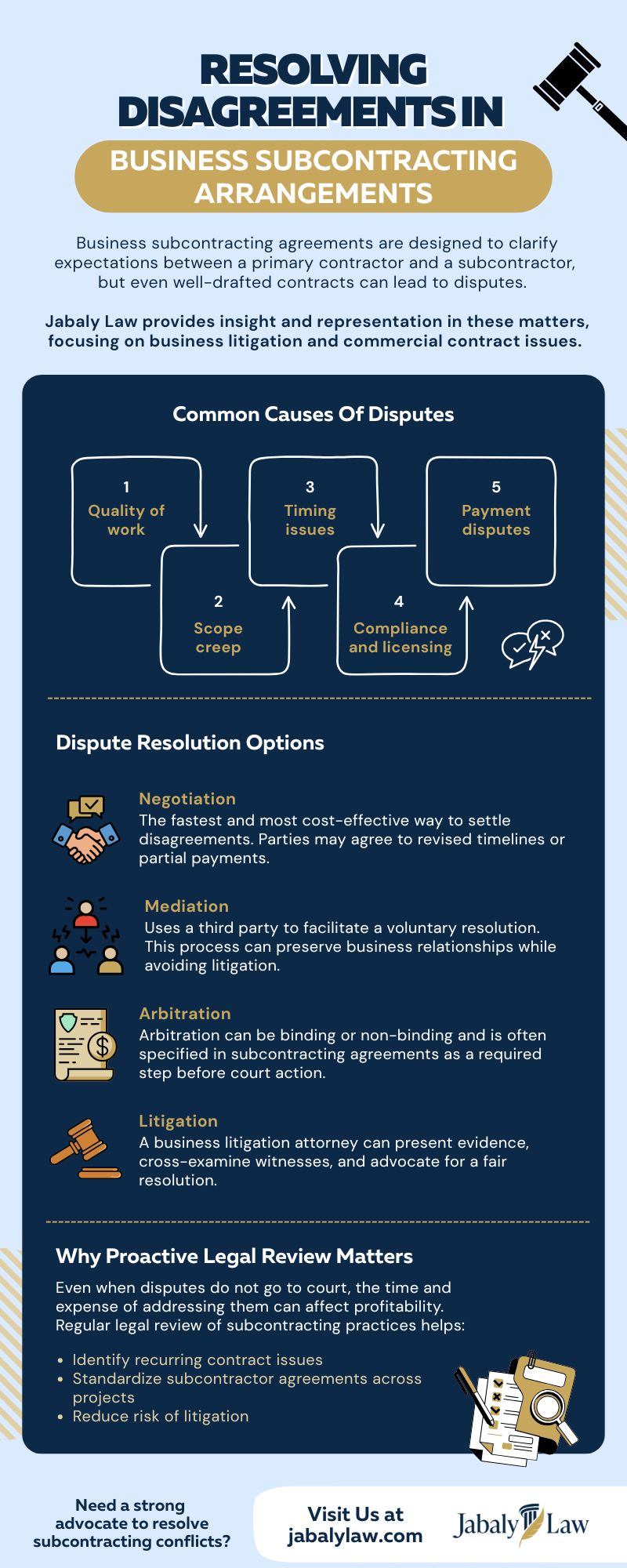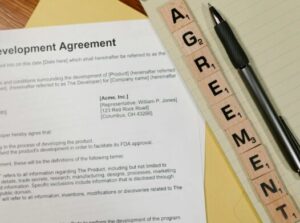What happens when a subcontractor misses a deadline, delivers subpar work, or disputes payment terms? These situations are more common than many businesses expect.
Business subcontracting agreements are designed to clarify expectations between a primary contractor and a subcontractor, but even well-drafted contracts can lead to disputes. This is where legal support becomes essential. Jabaly Law provides insight and representation in these matters, focusing on business litigation and commercial contract issues.
This article discusses the most common causes of subcontracting disputes, how courts evaluate them, and practical steps businesses can take to mitigate risk.
Understanding Business Subcontracting Agreements
Business subcontracting agreements establish the roles, responsibilities, and payment terms between a contractor and subcontractor. They usually specify:
- Scope of work:The exact tasks or services the subcontractor will perform.
- Quality standards:Deliverable specifications and performance benchmarks.
- Payment terms:Schedule, method of payment, and conditions for withholding.
- Deadlines:Project start and completion dates.
- Liability provisions:Allocation of risk if a dispute or delay occurs.
Disagreements can arise if any of these provisions are unclear or interpreted differently by the parties.
Common Causes of Disputes
- Quality of Work
Disputes frequently occur when one party believes the subcontractor failed to meet quality expectations. This can include use of materials not specified in the contract, errors in workmanship, or failure to meet safety or compliance standards. - Timing Issues
Missed deadlines can delay entire projects and result in penalties for the primary contractor. Disagreements about whether delays were excusable often lead to litigation. - Payment Disputes
Payment terms are one of the most litigated aspects of subcontracting arrangements. Disputes might involve partial payments, withheld payments due to alleged defects, or disagreements about change orders. - Scope Creep
When subcontractors are asked to perform additional tasks outside the agreed scope, disputes may arise regarding additional compensation. - Compliance and Licensing
Failure to comply with local licensing requirements or safety regulations can expose both the subcontractor and the hiring company to liability.
How Courts Evaluate Disputes
When disputes arise in business subcontracting arrangements, courts typically begin by carefully examining the written subcontracting agreement. This document is considered the foundation of the relationship between the parties and sets the baseline for determining rights and obligations. Judges analyze several key elements when deciding these cases:
- The Primary Contract
The primary contract between the main contractor and the client often establishes overall project objectives, timelines, and quality standards. Courts review this document to determine whether subcontractor performance aligns with the larger contractual framework. If the primary contract specifies certain deliverables, deadlines, or procedures for addressing deficiencies, these terms can influence the court’s interpretation of subcontractor responsibilities and the contractor’s authority to enforce compliance. - Contract Language
Precise contract language carries significant weight in business litigation. Courts focus on the exact wording of clauses related to payment schedules, performance requirements, dispute resolution mechanisms, and termination rights. Ambiguities may be construed against the party that drafted the contract, particularly if that party had greater bargaining power. This makes well-defined terms and conditions critical in avoiding misinterpretation. - Performance Evidence
Beyond the contract itself, courts examine evidence of actual performance. This may include project records, inspection reports, payment histories, and written correspondence between the contractor and subcontractor. Consistent documentation can demonstrate whether delays, cost overruns, or alleged deficiencies were caused by one party or resulted from external factors such as material shortages or client-requested changes. - Industry Standards
In situations where the contract is silent or vague, courts may rely on industry standards or customary practices to fill in the gaps. Expert testimony may be used to establish what a reasonably competent subcontractor would have done under similar circumstances. This approach helps ensure fairness when contract provisions are incomplete or subject to multiple interpretations.
This means that the strength of a party’s case often depends on its documentation practices.
Steps to Minimize Risk Before Disputes Arise
While disputes cannot be eliminated completely, careful planning can reduce their likelihood:
- Draft Clear Agreements:Every business subcontracting agreement should clearly outline scope, deadlines, payment triggers, and dispute resolution processes.
- Use Written Change Orders:Any modification to the original agreement should be documented.
- Maintain Thorough Records:Keep written communication, progress reports, and approvals to provide evidence in case of a dispute.
- Set Realistic Deadlines:Unrealistic schedules often lead to missed targets and litigation.
- Review Compliance Obligations:Verify licensing and insurance coverage before work begins.
Dispute Resolution Options
When disagreements escalate, several resolution methods are available:
- Negotiation
Direct negotiation remains the fastest and most cost-effective way to settle disagreements. Parties may agree to revised timelines or partial payments to resolve issues. - Mediation
Mediation uses a neutral third party to facilitate a voluntary resolution. This process can preserve business relationships while avoiding litigation. - Arbitration
Arbitration can be binding or non-binding and is often specified in subcontracting agreements as a required step before court action. - Litigation
When other methods fail, litigation may be necessary. A business litigation attorneycan present evidence, cross-examine witnesses, and advocate for a fair resolution.
The Role of Legal Counsel in Subcontracting Disputes
Legal counsel plays an essential role in preventing and resolving subcontracting disputes. Services may include:
- Reviewing and drafting business subcontracting agreementsto minimize ambiguity.
- Advising on change orders and modifications during the course of the project.
- Representing businesses in negotiation, mediation, or litigation.
- Providing guidance on compliance and risk allocation.
Working with an experienced business lawyer can help maintain project continuity and protect contractual rights.
When Subcontracting Disputes Lead to Litigation
Some disputes inevitably progress to formal litigation. In those cases, a business litigation attorney will focus on:
- Assembling Evidence:Contracts, emails, progress logs, and payment records become key exhibits.
- Identifying Breach:Proving that one party failed to meet its obligations.
- Calculating Damages:Determining the financial impact of delays, defects, or nonpayment.
- Seeking Remedies:Remedies can include monetary damages, specific performance, or termination of the contract.
Businesses in Fairfax, Arlington, or Washington, DC benefit from working with a firm that has experience in local courts and understands how regional rules apply to commercial litigation.
Drafting Stronger Subcontracting Agreements
Careful drafting is the first step to minimizing risk. Consider including:
- Detailed Scope Descriptions:Attach specifications and drawings to avoid ambiguity.
- Payment Schedules:Link payments to milestones rather than time intervals.
- Dispute Resolution Clauses:Outline whether mediation or arbitration is required before litigation.
- Termination Clauses:Clarify rights and obligations if the contract must be ended early.
- Indemnification Provisions:Allocate responsibility for third-party claims.
Regional Considerations for Virginia and Washington, DC
Businesses operating in Fairfax, Arlington, or Washington, DC should be aware that local contract law and court procedures can affect subcontracting disputes. Local rules may influence:
- Time limits for filing claims.
- Enforcement of arbitration provisions.
- Availability of attorney’s fees for the prevailing party.
Working with a business attorney familiar with these jurisdictions can help avoid procedural pitfalls.
Why Proactive Legal Review Matters
Even when disputes do not go to court, the time and expense of addressing them can affect profitability. Regular legal review of subcontracting practices helps:
- Identify recurring contract issues.
- Standardize subcontractor agreements across projects.
- Reduce risk of litigation through better documentation and clear expectations.
Preparing for Potential Litigation
Businesses that anticipate disputes should:
- Maintain detailed records of all correspondence.
- Document project progress with photographs and signed approvals.
- Preserve financial records related to subcontractor payments.
- Seek early legal review when a dispute begins to escalate.
This preparation strengthens a company’s position if litigation becomes unavoidable.
Taking the Next Step with Experienced Counsel
How can businesses reduce disruption when subcontracting disagreements arise? A business litigation attorney can provide focused representation and develop strategies that protect contractual and financial interests. Jabaly Law offers legal counsel services for businesses in Fairfax, Arlington, and Washington, DC, with experience handling contract disputes and commercial litigation. Working with a professional business attorney means having an advocate who understands the complexity of subcontractor relationships, court procedures, and dispute resolution options.
Businesses seeking a business law consultation in Alexandria, VA or a business transactions lawyer in Fairfax, VA can contact Jabaly Law for guidance. An experienced business lawyer can assist with reviewing agreements, negotiating settlements, and representing companies in court if necessary.




















